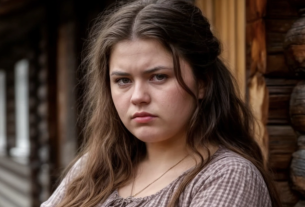Anya stood as if rooted to the floor in that very room where every object, every crack on the walls, was painfully familiar to her. The air was heavy with the scent of freshly ironed laundry, lavender, and that barely perceptible bitterness that always lingers in homes ruled not by love, but by habit. At the center of it all stood the fiancé they had “found” for her, as if she were not a living soul but some object to be sold off—carefully, so as not to offend either the family or herself. He stood there, slouched, pale, eyes downcast, as if he himself was not glad to be there. And Anya wanted not just to scream—but to howl, tear her hair out, call for her mother who was no longer there, and run. Run until her heart would burst out of her chest, until her legs forgot the way back. Run without looking back, without hearing her father’s voice, who had suddenly become a stranger, nor the rustling of her stepmother’s skirts, nor the whispers of the family gathered as if for a show.
Her father, who once carried her in his arms, called her “little one,” bought her candies, laughed at her mischief, now sat at the table unable to look her in the eyes. And the stepmother, Tatyana Ivanovna, ruled as always with that same boundless energy that seemed capable of moving mountains—if only it didn’t run up against the insurmountable wall of the daughter’s indifference. They all waited for a word, a gesture, a hint of approval from Anya. But she was silent. So silent it seemed even the walls held their breath, afraid to break the oppressive stillness. She couldn’t speak. Couldn’t even look at the gaunt, as if faded, young man who apparently felt no less awkward than she did. He didn’t look at her either, as if afraid to see in her eyes what was reflected in his own—fear, protest, misunderstanding.
“Oh, why are we just standing here in the doorway?! Dear guests, please come in! The table is set! Please!” Tatyana Ivanovna bowed to the future relatives, waving her arms as if at a ball, but every gesture was laden with a hidden reproach toward her stepdaughter. The glances she cast at Anya were sharp as needles. “God has sent a trial!” she thought, gritting her teeth. “I raised her as my own, and for what? She doesn’t rejoice, doesn’t smile, stands like a monument to herself. And who did such a blissful one come from? Probably the mother…”
But the mother was completely different—dreamy, gentle, like a figure out of an old painting. She played the piano, read books, lived in a world where the soul mattered more than money. But that world was too fragile. Too fragile for real life. Books didn’t save her, music didn’t protect her. She left early, leaving her daughter in the hands of her father who, although he loved, didn’t know how to express his feelings. His care showed in bread, a piece of meat on the table, firewood chopped in winter. But what was in the girl’s mind, what worried her, what she dreamed of—he didn’t think about it. Not because he didn’t love her, but simply because he didn’t know how.
“Well, come on, Anya! Welcome the guests!” Tatyana Ivanovna didn’t just say it—she pinched her stepdaughter’s arm as if trying to bring her back to life. But Anya didn’t wake. Didn’t lift her eyes. She just sat staring at the tablecloth she had washed, starched, and ironed herself. And when her father asked if she would go for Mikhail, she only nodded, almost imperceptibly, and a single tear rolled down her cheek—quiet, bitter like an autumn rain.
But the guests liked it. They decided the girl was modest, well-mannered. So when they left, Tatyana didn’t scold Anya, just sighed as usual:
“You should look more cheerful, Anyutka. Your husband will thank you for it. Nobody wants to look at sadness and sorrow—you’ll howl from boredom yourself! And a sweet smile always warms a husband’s heart. Remember that! And don’t cry! Not without a reason!”
Anya didn’t cry. She just had no strength to be happy. But she had a clear thought: better to marry than live in this house where you are in everyone’s way, where you are unnecessary. Father was, of course, not a stranger, but not close either. He had three sons, and she was a daughter who needed to be placed, married off, given a dowry, a contract drawn up. That was all.
But joy from this new stage of life did not come either. Mikhail… She knew him no better than the moon. Only the stepmother said the “fiancé was chosen,” and that was all. She didn’t raise her eyes when the matchmakers came, but still managed to throw a sidelong glance at the future husband. And she didn’t like him. Too pale, too… expressionless. As if someone had wiped his face with a cloth trying to make it decent but never succeeded. Eyes—either gray or blue, you couldn’t tell. Chin—soft as dough, lips—thin like a line in a notebook. Not handsome. Although she herself was not especially beautiful either. Only her eyes—big, blue—and hands—the same as her mother’s, thin with long fingers. But those hands could play the piano, create music. And she wasn’t even allowed to touch the instrument. It was sold immediately after her mother’s death. Who needs it in a working family where every ruble counts?
Anya was ordinary. Neither beautiful nor striking. Modest, quiet, with a thin braid, as if someone had lacked hair for her. The stepmother tried—boiled decoctions, rinsed “Anutka’s three feathers” in some waters—but to no avail. Father just laughed:
“Can’t get curly hair from her, Tanya! Don’t waste your time!”
But Anya wasn’t offended. She knew—it was care. Not always gentle, but real. Tatyana tried. Taught her to cook, sew, smile. “I’ll find you a good husband, Anyutka! So you’ll live like behind a stone wall!”
“Really?” she asked, looking into her stepmother’s eyes.
“When have I ever lied to you? And why would I?”
And it was true. She never hurt Anya. Not like she treated her sons, but didn’t spoil her either. Held her accountable for everything—studies, behavior, managing the house. Didn’t forbid books, though she herself didn’t like them.
“You, Anya, probably took after your mother. My mother-in-law, may she rest in peace, used to say your mother came from a learned family and was no match for your father. When she agreed to marry him, everyone was surprised. And he, to please his bride, bought her a piano. Sold the grandfather’s house but bought a piano. Your grandmother was very upset with him for that, but said nothing because she understood such love happens once in a lifetime and not everyone is lucky. She wasn’t.”
Here Tatyana fell silent, but Anya understood. Her parents lived not by love. There was no fire in their marriage like that which burned in her mother’s heart. There was care, habit, duty. But no love. She saw her mother’s portrait in her father’s room and often noticed how the stepmother thoughtfully looked at that face as if trying to understand: why did he love her and not Tatyana? What was in that woman that the husband was ready to give everything for?
There was no answer. And Tatyana just sighed but still tried. Loved as she could. Without asking anything in return.
And the father? He was not bad. Spoiled his wife on holidays, helped with the children, washed diapers, bathed the babies. And in this quiet care for the family, love was born. Not loud, not bright, but real.
“We’ll sew you a beautiful dress. So you won’t be ashamed! You’re your father’s only daughter!” Tatyana opened the wardrobe doors and from there flowed the best tablecloths, bed linens, and china sets.
“And what’s this for?” Anya asked, seeing the stepmother pull out the best lace tablecloth from the wardrobe.
“Your dowry,” Tatyana answered briefly. “What are you standing there for? Help!”
And when two boxes with new porcelain sets appeared from the wardrobe, which Anya had only seen once when her stepmother and father brought them home, she could only gasp—in surprise, in amazement, at the fact that even in this house, miracles could happen.
Anya looked at the boxes as if not believing her eyes. As if expecting everything to vanish in a moment like smoke or morning mist melting under the sun’s rays.
“And this…” she blurted out, full of bewilderment and barely restrained excitement.
“Yours, girl!” Tatyana Ivanovna answered softly but with a note of pride. “I persuaded your father to buy it. It’s not right to give you to your husband empty-handed. Or are you not our daughter? Everything is settled! You have everything! No need to blush!”
And then, for the first time in many days, the anxiety in her chest receded a little. Anyuta’s lips twitched—a very slight movement, like butterfly wings in the pre-dawn silence. It was a shadow of a smile, almost invisible but alive. And Tatyana pretended not to notice—to not embarrass, not scare away that fragile moment when a spark of true motherly care slipped between them.
“There’s still so much to do! We have to hurry!” she exclaimed cheerfully, hiding in her voice that very joy a mother feels sending her daughter into adult life.
The remaining days until the wedding passed for Anya like a fog. She remembered how she and Tatyana sewed, tried on, sorted through the dowry, how her father went to shops choosing gifts for the bride. But all this was like a background—a black-and-white film where colorful spots of hope flashed. And that ray of hope was called Mikhail.
He came almost every evening. Brought modest gifts—candy, fruit, sometimes a bouquet of wildflowers. Sat quietly in a corner of the room, hunched, looking at her with his light, almost colorless eyes. Didn’t say much, but looked as if he wanted to memorize every line of her face. And whenever he noticed Anya starting to fidget with her braid—a sign of her inner anxiety—he would get up, say goodbye, and leave, leaving behind silence and a strange feeling—not fear, not joy, but something in between: cautious, shy anticipation.
But only on the wedding day did Anya suddenly awaken, as if from a long sleep. She stood before the mirror, dressed in a snow-white gown that Tatyana had sewn with such love as if wanting to sew all her care into it. The veil, like a cloud, gently touched her shoulders, and in her eyes reflected not just a bride—she saw a woman. Tall, slender, with burning eyes and a heart that for the first time beat faster than usual.
“Don’t be afraid, girl!” whispered the stepmother, gently adjusting the veil and lightly touching her shoulder. “Everything will be fine!”
These words, simple and warm like sunshine, warmed her soul. Anya turned to the mirror again and couldn’t believe her eyes. Was that really her? The very girl who just yesterday seemed so ordinary, even plain?
Tatyana had outdone herself. The dress was truly beautiful—with delicate embroidery, a full skirt, a soft shine of expensive fabric. Like something straight from the pages of a fairy tale book. And at that moment Anya understood: yes, today a new life begins. Perhaps a little scary, but no longer alien. Her own.
And then everything spun, whirled like a waltz. Guests, toasts, music, embraces of relatives, glances, smiles. And not a single free moment to stop, to think if she was making a mistake. Only later, when the hour came and they were left alone, she felt how Mikhail’s fingers trembled gently squeezing her hand. His gaze changed—open, trusting, like a child who first saw stars. He looked at her without fear. Without masks. And for the first time he smiled—genuinely, warmly, as if he had found his home.
Then there was the home. Small, cozy, with white curtains that fluttered on the windows from the morning breeze. And a cat, gifted by Mikhail in the first week. “It will sing you a song,” he said with a smile. And indeed, the cat meowed as if singing. And with it, the house grew quieter, warmer.
And joy—at first timid, like the first drops of spring rain, then brighter and brighter. Like the dawn slowly chasing away the darkness. She was about to step out the door but suddenly stopped. Mikhail smiled and, without a word, lifted her into his arms.
“Like this… I’m ready… For a lifetime…” he whispered, looking straight into her eyes.
Anya smiled in response—shyly but sincerely—and nodded:
“All right…”
With each day, her smile grew wider. With each day, she discovered in this man new sides—kindness, strength, confidence hidden behind his shyness. And years brought them children, home comfort, old photographs stacked in a worn box, and stories passed from generation to generation.
Many years later, a little girl with a turned-up nose and big eyes like two stars poked a finger at one of those photographs standing on the mantelpiece in her grandfather’s old wooden house.
“Who is this?”
“That’s your great-grandmother. Anna.”
“How beautiful…”
“You look very much like her.”
“Why is she wearing such a strange outfit?”
“She was a nurse. An extraordinary woman. Brave. She went through the whole war, going to the front after her husband—your great-grandfather Mikhail. He was a doctor. A surgeon. And grandma loved him very much. So much that she couldn’t stay home when he went to war. She left her sons to be raised by her stepmother—Tatyana Ivanovna—and went to serve. She knew that there, in the rear, her children would be safe.”
“And did it work?”
“It did. Tatyana Ivanovna saved not only her own children but also two neighbor boys. After the war, Anna and Mikhail adopted them. They are your great-uncles Pavel and Semyon.”
“Grandpa, why is she smiling like that?”
“Because she was happy. She told me that as a child she was called the ‘Princess Who Never Smiled.’ But during the war, she got another name—Joy. Everyone in the hospital knew that near her pain became easier and the heart started beating stronger. Grandpa Misha said many wounded owed their lives not only to his operations but also to her smile. She could lift a person from the brink of death with a single glance. She had such strength.”
“How could she be the ‘Princess Who Never Smiled’ if she could smile like that?”
“Exactly! Strange, isn’t it? She went through the war, lost friends, was wounded twice, but always kept the light in her eyes. Then she raised six children, brought up grandchildren, helped everyone in need. And even now, long after she’s gone, her love lives on in everyone she once touched.”
“Will I be able to do that?” the girl asked, running her fingers over the photo frame. “Like her? Love…”
“Of course!” Grandpa replied, kissing his granddaughter on the forehead. “You are her continuation. If you want it, who can stop you?”
“No one!” the girl declared confidently, straightening her back and looking into her beloved grandpa’s eyes.
And in her voice sounded that very strength—the strength of love passed down through generations like the light of a beacon, guiding those still learning to live.



